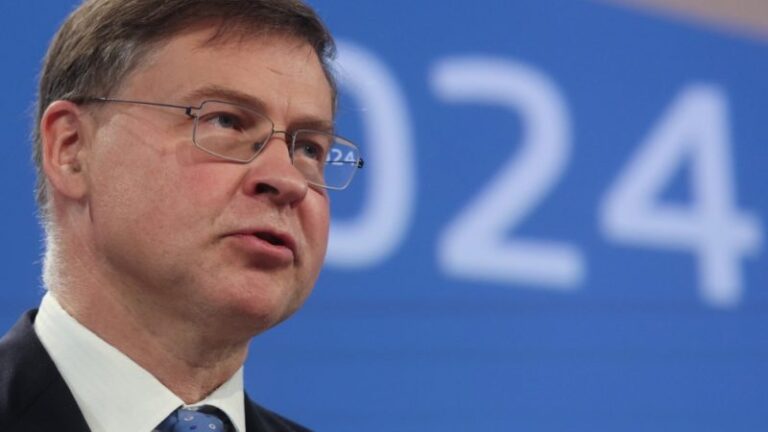The European Union’s increased focus on economic security will not undermine the fundamental openness of the European economy, the EU’s top trade official said on Tuesday (2 July) in a move to reassure business.
Speaking at an event organised by Brussels-based lobby group BusinessEurope, Trade Commissioner Valdis Dombrovskis said the EU executive’s recent push for “protective” measures, such as adjusting export controls and strengthening screening of foreign direct investment, did not mean Europe was moving towards full-scale economic protectionism.
“Europe has traditionally been a trading continent and will remain so in the future,” Dombrovskis said, adding that the free exchange of goods was essential to give the bloc access to key raw materials and enable European companies to “achieve economies of scale.”
The commissioner also said he “fully” supported lobby groups’ recent calls for policymakers to strike a “balance” between the three pillars of the EU’s economic security strategy – which aims to protect economic security while increasing competitiveness and partnering with “like-minded” countries.
“It is very important that any action we take maintains a balance between the three pillars,” Dombrovskis said.
The comments came after BusinessEurope’s Executive Director Markus Beyer reiterated that EU efforts to strengthen security should not affect the EU’s weakening competitiveness, saying: “We must be extremely careful that this does not lead to disguised protectionism.”
“There has to be a very clear line between those two points,” Beyer said.
Dombrovskis, who also serves as the European Commission’s executive vice-president, voiced similar support for a “dedicated structured exchange platform” on economic security proposed by industry groups, which would bring together EU officials, academics, public authorities and members of the private sector.
“I personally support the creation of such a platform,” the EU official said, adding that the final decision would rest with his successor.
Dombrovskis, a former Latvian prime minister who was recently nominated by his home country for a third term as commissioner, is widely rumored to want to be solely in charge of the economy in his next term.
Dombrovskis also said there was a crucial difference between economic security and “ensuring a level playing field” in international trade, and that a recent series of EU investigations targeting Chinese subsidies for green technologies were conducted exclusively for the latter reason.
“When discussing trade protection, it is important to distinguish between ensuring a level playing field and the impact on economic security,” he said.
Temporary tariffs on Chinese-made electric vehicles announced by the EU last month will come into effect this Thursday if no agreement is reached.
A European Commission trade spokesman told Euractive that “the two sides will continue to consult at all levels over the coming weeks in order to reach an agreement.”
[Edited by Anna Brunetti/Alice Taylor]


